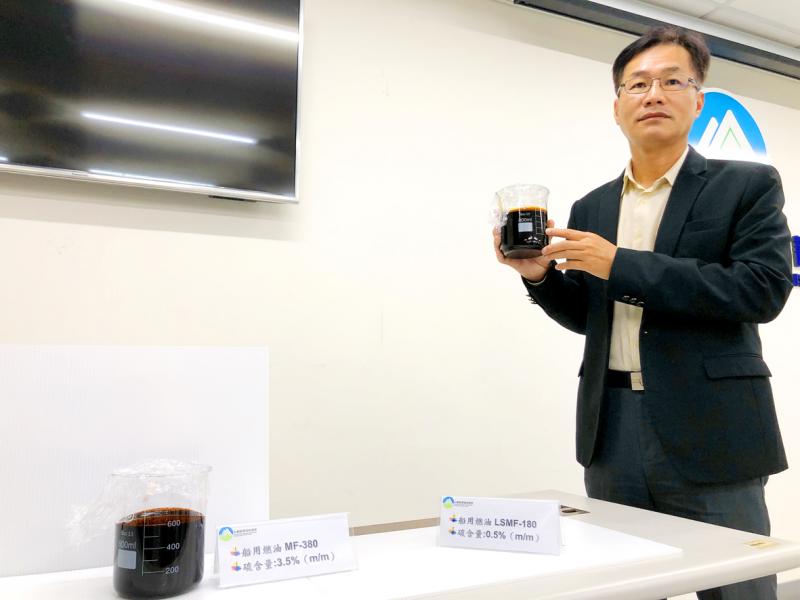All ships, commercial aircraft and road vehicles would have to follow stricter rules for fuel from July as part of efforts to reduce sulfur oxides and carcinogenic pollutants to improve air quality, the Environmental Protection Administration (EPA) said yesterday.
The combustion of fuel containing sulfur and hydrogen produces sulfur oxides and hydrocarbons, causing air pollution, acid rain and smog, Department of Air Quality Protection and Noise Control Director-General Tsai Meng-yu (蔡孟裕) told a news conference in Taipei.
To curb pollution from land, sea and airborne vehicles, the EPA has tightened regulations on fuel for ships and aircraft, as well as gasoline and diesel for road vehicles, he said.

Photo: Lo Chi, Taipei Times
From July, all ships must use fuel with a sulfur content of less than 0.5 percent, instead of the current 3.5 percent, Tsai said.
Since last year, the Commercial Port Act (商港法) has required the nation’s vessels operating on international routes to use fuel with a sulfur content of less than 0.5 percent, which has reduced sulfur dioxide levels by 29 percent in Keelung and 45 percent in Kaohsiung’s Siaogang District (小港) from 2018, Tsai said.
After the new rule covering all ships goes into effect, it would eliminate an estimated 5,229 tonnes of sulfur dioxide emissions in a year, while sulfur dioxide levels in Keelung and Siaogang are expected to drop a further 9 percent and 16 percent respectively from last year’s levels, he said.
While Taiwan is not a member state of the International Maritime Organization, it is voluntarily observing the International Convention for the Prevention of Pollution from Ships, which helps improve air quality and allows domestic ports to remain competitive globally, he added.
Commercial aircraft would be required to use fuel with no more than 0.2 percent sulfur content, less than the current 0.3 percent limit imposed by the Ministry of Economic Affairs, Tsai said, adding that military aircraft are not covered by the EPA’s rule.
The limit for benzene in gasoline is to be reduced from 1 percent to 0.9 percent, while the maximum allowed level of polycyclic aromatic hydrocarbons in diesel would be tightened from 11 percent to 8 percent, Tsai said.
Benzene and polycyclic aromatic hydrocarbons are carcinogens that affect human health and the environment, he said.
By the time the new rules go into effect, all gas stations run by CPC Corp, Taiwan and Formosa Plastics Group are to provide qualified fuel products, the EPA said, urging people not to use fuel from unknown sources.

Chinese spouse and influencer Guan Guan’s (關關) residency permit has been revoked for repeatedly posting pro-China videos that threaten national security, the National Immigration Agency confirmed today. Guan Guan has said many controversial statements in her videos posted to Douyin (抖音), including “the red flag will soon be painted all over Taiwan” and “Taiwan is an inseparable part of China,” and expressing hope for expedited reunification. The agency last year received multiple reports alleging that Guan Guan had advocated for armed reunification. After verifying the reports, the agency last month issued a notice requiring her to appear and explain her actions. Guan

A preclearance service to facilitate entry for people traveling to select airports in Japan would be available from Thursday next week to Feb. 25 at Taiwan Taoyuan International Airport, Taoyuan International Airport Corp (TIAC) said on Tuesday. The service was first made available to Taiwanese travelers throughout the winter vacation of 2024 and during the Lunar New Year holiday. In addition to flights to the Japanese cities of Hakodate, Asahikawa, Akita, Sendai, Niigata, Okayama, Takamatsu, Kumamoto and Kagoshima, the service would be available to travelers to Kobe and Oita. The service can be accessed by passengers of 15 flight routes operated by

GIVE AND TAKE: Blood demand continues to rise each year, while fewer young donors are available due to the nation’s falling birthrate, a doctor said Blood donors can redeem points earned from donations to obtain limited edition Formosan black bear travel mugs, the Kaohsiung Blood Center said yesterday, as it announced a goal of stocking 20,000 units of blood prior to the Lunar New Year. The last month of the lunar year is National Blood Donation Month, when local centers seek to stockpile blood for use during the Lunar New Year holiday. The blood demand in southern Taiwan — including Tainan and Kaohsiung, as well as Chiayi, Pingtung, Penghu and Taitung counties — is about 2,000 units per day, the center said. The donation campaign aims to boost

The Central Weather Administration (CWA) said a magnitude 4.9 earthquake that struck off the coast of eastern Taiwan yesterday was an independent event and part of a stress-adjustment process. The earthquake occurred at 4:47pm, with its epicenter at sea about 45.4km south of Yilan County Hall at a depth of 5.9km, the CWA said. The quake's intensity, which gauges the actual effects of a temblor, was highest in several townships in Yilan and neighboring Hualien County, where it measured 4 on Taiwan's seven-tier intensity scale, the CWA said. Lin Po-yu (林柏佑), a division chief at the CWA's Seismological Center, told a news conference